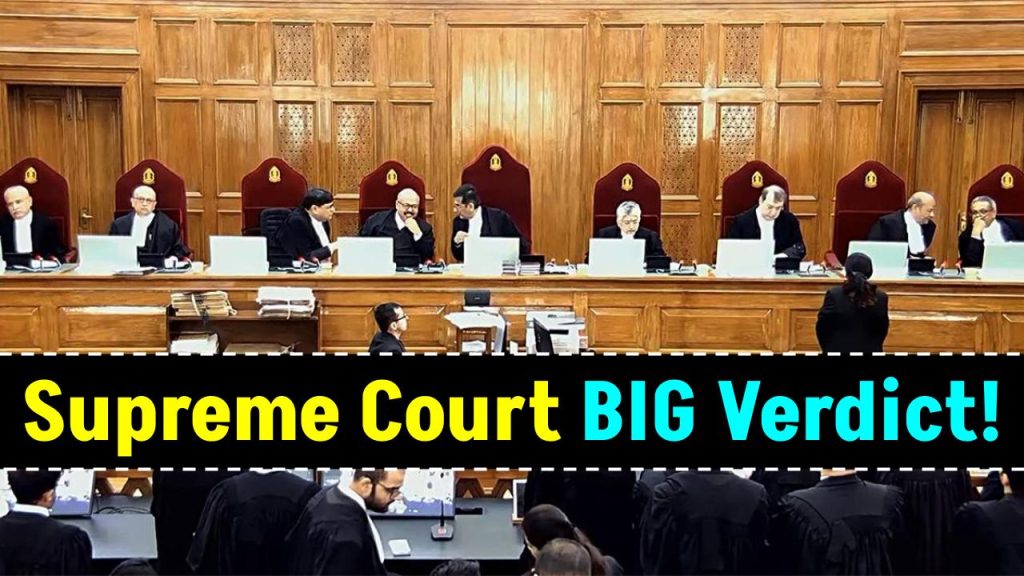
The Supreme Court has issued landmark rulings on land ownership and eviction practices, marking a significant victory for property owners. These rulings affect both India and the United States, ensuring stronger legal protections for landowners against unlawful evictions and demolitions.
In India, the Supreme Court has outlawed arbitrary demolitions by state authorities, reinforcing the right to due process. Meanwhile, in the United States, the Court’s decision upholds federal land control and supports rent stabilization laws, preventing unjust evictions and rent hikes.
Key Highlights
| Topic | Details |
|---|---|
| India’s Supreme Court Ruling | Outlawed arbitrary demolitions without due process. |
| United States Supreme Court Decision | Declined to hear cases challenging federal land control and rent stabilization laws. |
| Impact on Landowners | Stronger property rights, legal protection from eviction. |
| Legal Precedents Set | Emphasis on due process before eviction or demolition. |
| Next Steps for Affected Parties | Landowners advised to seek legal guidance before eviction disputes. |
| Official Resources | India Supreme Court Website, U.S. Supreme Court Website |
The Supreme Court’s recent rulings reinforce landowners’ rights, ensuring that no one can be evicted without due process. In India, the Court has outlawed arbitrary demolitions, while in the U.S., the decisions uphold federal land control and tenant protections under rent stabilization laws.
What does this mean for you?
- If you’re a landowner, these rulings give you stronger legal protection.
- If you’re a tenant, you cannot be unfairly evicted under rent control laws.
For more details, check out the official resources:
India Supreme Court
U.S. Supreme Court
Also Check: Trump & Musk Under Fire! Major Lawsuits Piling Up – Supreme Court Battle Ahead!
Supreme Court BIG Verdict: No More Bulldozer Demolitions Without Legal Process
What Led to the Ruling?
Over the past few years, India has seen an increase in state-led demolitions of properties belonging to individuals accused of crimes or protesting government policies. Often called “bulldozer justice,” these demolitions were carried out without proper legal procedures.
Citizens, activists, and legal experts raised concerns that these demolitions violated fundamental rights, particularly the right to property under Article 300A of the Indian Constitution.
What the Supreme Court Decided
On November 13, 2024, the Supreme Court of India ruled that no one can be evicted or have their property demolished without following proper legal procedures. The Court mandated that:
- Prior Notice Must Be Given – Government authorities must inform property owners before taking action.
- Legal Proceedings Must Be Completed – Eviction or demolition can only happen after a court order.
- Video Documentation Is Required – Authorities must record the entire process to ensure transparency.
- Compensation Must Be Provided If Eviction Is Unlawful – If a demolition is later found illegal, the government must compensate the affected party.
Why This Matters:
This ruling is a major victory for property owners, as it ensures that the government cannot seize or destroy property arbitrarily. It also strengthens citizens’ trust in the rule of law.
Source: Reuters Report on Supreme Court Guidelines
Also Check: CBSE Board Exams 2025: Everything Students and Parents Need to Know
Supreme Court BIG Verdict: U.S. Supreme Court Rulings on Land Control & Rent Stabilization
Utah’s Challenge to Federal Land Ownership
In the United States, the Supreme Court recently rejected Utah’s lawsuit seeking control over 18.5 million acres of federal land.
What Was Utah’s Argument?
- Utah’s state government challenged federal control over public lands, arguing that these lands should belong to the state.
- State officials wanted to develop the land for recreation, energy projects, and infrastructure.
What Did the Supreme Court Decide?
On January 13, 2025, the U.S. Supreme Court refused to hear the case, leaving federal management unchallenged.
Why This Matters:
- The ruling ensures that federal land protections remain in place, preventing state governments from using public land for commercial interests.
- This decision affects conservation efforts, Indigenous rights, and local economies that depend on federal land policies.
Source: AP News on Utah’s Land Case
Supreme Court BIG Verdict Upholds New York’s Rent Stabilization Laws
Another critical case involved New York’s rent stabilization laws, which limit rent hikes and make tenant evictions more difficult.
What Landlords Wanted
- Landlord groups argued that these rent laws violated the Fifth Amendment’s “takings clause”, which prevents the government from seizing property without compensation.
- They claimed that rent control unfairly restricts their right to increase rents and limits eviction rights.
Supreme Court’s Decision
On November 12, 2024, the Supreme Court declined to hear the case, effectively upholding New York’s rent stabilization laws.
Why This Matters:
- Tenants are protected from sudden evictions and excessive rent hikes.
- Landlords must comply with local housing regulations, ensuring affordability.
- This sets a legal precedent for rent control policies across the U.S.
Source: Reuters on Rent Stabilization Ruling
Also Check: RBI’s New Rules Make Personal Loans HARDER to Get! Check What’s Changed!
Supreme Court BIG Verdict: How These Rulings Impact Landowners and Tenants
For Landowners:
- Greater Legal Protection – Property cannot be seized or demolished without due process.
- Clearer Eviction Rules – Governments must follow strict procedures before evictions.
- Compensation Rights – If a property is wrongly seized, landowners can claim damages.
For Tenants:
- Rent Control Stays in Place – Protection from excessive rent hikes.
- Eviction Protection – Landlords must follow legal procedures before eviction.
- More Housing Yes, but they must follow the rent stabilization laws, which make it harder to evict tenants without proper cause. Stability – Long-term rental security for tenants in major cities.
Supreme Court BIG Verdict (FAQs)
Can landlords in New York still evict tenants?
Yes, but they must follow the rent stabilization laws, which make it harder to evict tenants without proper cause.
What should I do if my property is being demolished in India?
You should immediately seek legal help and file a petition in the High Court or Supreme Court if proper notice was not given.
Does Utah still have control over its public land?
No, the U.S. Supreme Court upheld federal control over public lands, ensuring they remain protected from state-led development.
Will other states follow New York’s rent control laws?
It depends, but this ruling strengthens rent control laws in cities like Los Angeles, San Francisco, and Washington D.C..
How can landowners challenge an eviction or demolition?
Landowners should:
Check if proper notice was given.
Seek a lawyer specializing in property law.
File an appeal in court to block illegal eviction or demolition.









